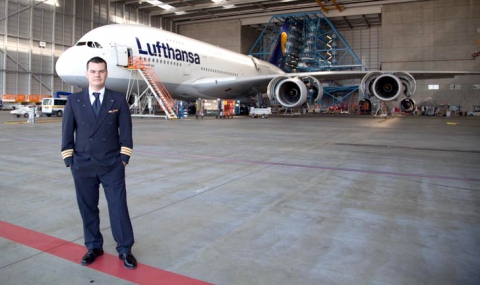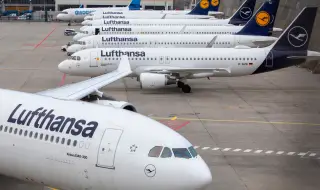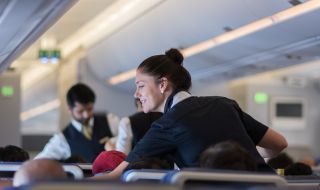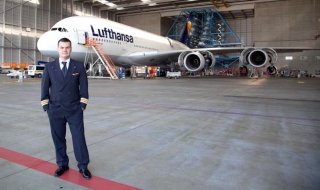Nowadays getting a diploma does not guarantee you a well-paid job, much less a star-studded career. Good education is the right mix of theoretical knowledge and a tremendous amount of practical skills. Some of the very best universities the world over have put the emphasis on practical training. Most of them can get you a job at a world-class company and that makes them even more popular. But is it the same for some of the more specialized professions such that of the aircraft pilots? Well, let us take a “sneak” peek inside one of the largest airline companies in the world, the German national air carrier – Lufthansa. To do this, we have enlisted the help of Mr. Mario Bakalov who sat down with us for an exclusive interview for the readers of Fakti.bg.
Of the Lufthansa’s 5 000 pilots only 400 are qualified to fly the Airbus А380. Of these only one happens to be Bulgarian, his name is Mario. Airbus А380 is the largest passenger jet in the world, it is also the heaviest and has the most modern equipment onboard. It can fly 526 passengers plus 24 crew members. Mr. Bakalov, who graduated Lufthansa’s Pilot School has now become an instructor there teaching future pilots how no improve flight safety.
- Mr. Bakalov, what are the advantages for an airline company such as Lufthansa to have its own pilot school?
- Most airline companies hire their pilots from the job market. Lufthansa however hires mostly pilots that were trained in-house. It begs the question: why? Well, it is simple. We have all been trained in one and the same school, by the same teachers. We share the same philosophy and abide by the same standards when we enter the cockpit. Even when we have not met before, we work together very easily.
You do not have to have known the person from before to be able to work with them well. All you need to have is what we call social competence. This includes several things like being able to operate under stress, being able to work in a team, being able to make the right decisions at the right time, and being able to stay aware of your surroundings and I am not talking only about the instrument panels a couple of feet from you, it is more than that. Having social competence is crucial, in our line of work social knowledge is equally important as technical knowledge.
Another advantage that comes from having your entire pilot roster trained at the same place is the high degree of interchangeability of the human resource of the company.
- What are the requirements and how does one apply for the Lufthansa Pilot School?
- All candidates must have a high school diploma, in-depth knowledge in math and physics and technical aptitude. All candidates must be healthy and be between 1.65 and 1.98 meters tall. It is extremely important for future pilots to be responsible and disciplined. They have to speak German. For more information you can visit: www.lufthansa-pilot.de.
There are two series of exams. The first one determines whether or not the candidate can become a pilot and includes tests in math, physics, English, spatial reasoning aptitude, and multitasking. The successful candidates then go on to the second series of exams which takes place several months later. It tests their social competence, a term we already mentioned. The first series of exams determines whether or not a person has the facilities to be trained as a pilot. The second one determines whether or not that person can fit in Lufthansa and one day become a flight captain for the company. Candidates who pass the second exam undergo medical tests and if they are healthy, they start their training.
- What is the training like and how long does it take to complete?
- It consists of several stages. The first stage, which takes 6 months, takes place in Bremen where the students receive their theoretical training. Then they go to Phoenix, Arizona in the United States of America for 4 to 5 months. It is where the practical part of the training is conducted. They start off by flying small planes.
- Why Phoenix?
- There are between 320 and 340 sunny days per year. Most student pilots fly by what they see through the window instead of relying on their instruments and that is why having good weather is a must. In Phoenix they have lots of space, good weather, and they speak English. This is important because English is the language of the aviation industry. Also, most of the textbooks are written in English.
After that students come back to Bremen for six months where they complete their theoretical training. At this point they are required to take the Airline Transport Pilot License (ATPL) Test. The final part of flight training takes place in Germany where they train on Cessna Citation. This is a business-class jet aircraft. This particular machine was chosen for this stage of training because when you are inside it looks and behaves like most of the modern airliners. Several years ago the company invested a large amount of money in outfitting a new, fast Citation with a cockpit similar to those of the big passenger jets.
Once this stage is over, pilots go to Frankfurt for the last phase of their training which also takes six months to complete. Getting a pilot’s license is only part of the process. This does not allow you to fly just any type of plane. This is a fork in the road for pilots as they are required to choose their future career path. Some specialize in flying Boeing aircraft and the others go with Airbus. Now that our students have become professional pilots, it is time to decide what type of plane they will fly. This decision is made based on demand. Certain types of plane require the so called Type Rating and the student, who has by now become a professional pilot, can only fly them. Initial training is done on a flight simulator. Then the student flies with instructors and passengers. At the end, once the student gets his license, he becomes first officer for the particular aircraft type.
- What type of career can a graduate of Lufthansa’s Pilot School expect to have?
- After you graduate your typical career path usually looks like this: First Officer on European flights, Airbus 320 maybe; then you move up to First Officer on long flights – Airbus 330/340, Airbus 380, Boeing 747; Then you become Senior First Officer which is one level up. After that you become flight captain on European flights and get back on an Airbus 320 or Boeing 737. The top of the ladder is Flight Captain on long flights.
- How many pilots graduate Lufthansa’s Pilot School every year?
- Between 200 and 300. It is interesting to know that 7 % of Lufthansa’s pilots are women.
- 200 – 300? Is that many or is it few?
- Depends on the market, really. A while back there was a shortage of pilots but now we have more trained pilots. Sometimes, after they graduate they have to wait several months before they are hired. The difficulty is to anticipate the business cycles in our industry. There are almost two years from admittance to pilot school until they start flying as pilots for Lufthansa. To close the gaps, the ready pilots are offered to work at other departments in the company as trainees, which helps them to get a good insight on how Lufthansa actually works.
- Many people are afraid of flying. How do you convince them that flying is not only the fastest but also the safest way to travel?
- First you hit them with the cliché that statistically flying is the safest way to travel, but people rarely find this convincing. As with other things, training is crucial. One of the most important things is to have a flight crew, pilots and stewardesses, who are well trained. More importantly, they must keep up with the latest trends. In other words, you need continuous training in the form of exercises and seminars. Professional training consists of initial training and the subsequent continuous additional training. The third major factor is the so called safety culture. It means that every last person working for the company must understand, believe, and abide by the safety rules. The fourth factor is to have meticulously inspected and perfectly maintained equipment.
- You also conduct training exercises and seminars. Would you like to tell us more about that?
- The job of a pilot is mostly technical but I take a keen interest in the “softer” aspect of it, the so called human factor. This is why I conduct human factor training. This involves seminars for pilots and stewardesses where we discuss issues and do exercises focused on the role of the individual in the aviation industry. We try to learn from past mistakes. Our goal is to improve security. Attendance at these seminars is mandatory and they have become part of our corporate culture. Every one of our pilots is required to attend a seminar once every three years.
Every other month I go to the Pilot School in Bremen to teach Human Factor Training 101. We have active pilots teaching courses there in order to integrate theoretical knowledge and practical skills. Students have a lot of respect for the pilots who come to teach them.
- How did you come up with the idea for joint seminars for pilots and air traffic controllers and what is their goal?
- As a pilot you have to work with many people. A large and a very important part of our job is to work with air traffic controllers, yet we never see their faces. They are just voices in the headset. The idea behind the so called joint training program is to get these two groups of people who work together every day and have them train together as well. As a pilot I know what the most important aspect of my colleague’s work is. If you knew what my job was like and what my professional priorities were, you would be able to identify much more efficiently the information I need to get my job done in the best possible way. This improves both efficiency and security.
The idea for these seminars came to me more than three years ago. We invited air traffic controllers over, showed them some video footage, and then analyzed it together. It is hard to measure efficiency but in aviation the human factor plays a crucial role and so far both groups (pilots and traffic controllers) are happy with our seminars.
- What made you pursue a degree in psychology?
- It was again the human factor. The majority of the incidents in aviation are caused by the human factor and I see that every day at work. It was the logical next step for me to go after a degree in that field. Airbus A380 carries 526 passengers. I often come to the door of the aircraft to see what kind of people will fly with us. I look in their faces. Some of them smile and say “Hallo”, others ignore me completely preoccupied with their thoughts. Then there is the staff. We have more than 25 000 people working for us – stewards, stewardesses, pilots and everyone has their own unique perspective.
- It is your ambition to have an Airbus A380 land at Sofia Airport…
- Bringing the A380 to Sofia for one day is a dream I have for long. I’m convinced it would be a great thing for Bulgarians, too Technically, there is no problem to do it. But we still need to find a number of partners to support this idea. I am positive we will make it happen, soon!.





Напиши коментар:
КОМЕНТАРИ КЪМ СТАТИЯТА